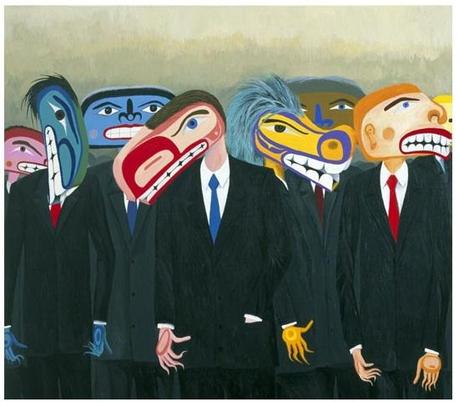Qui croit encore que la puissance n'est qu’une question de souveraineté, d'armée ou de territoires ? De nos jours, les multinationales jouent un rôle très important qui peut être comparé dans certains domaines (les services de renseignement, la défense et la protection des frontières…) à celui des Etats. Cette tendance ne concerne pas uniquement les multinationales occidentales : depuis le début du XXIe siècle, les multinationales des pays émergents gagnent des places dans la hiérarchie mondiale.
In 1974, Joseph Nye noted that the revenues of the top ten multinational companies (MNCs) were greater than the gross national product of some 80 member-states of the United Nations.
Back in present days, several MNCs are among the 100 largest economic actors in the world (see graph). In 2009, two petroleum multinational companies (Royal Dutch Shell and Exxon Mobil), rank respectively number 21 and 22 among the global biggest economies, just behind Belgium and above Poland.
As MNCs are becoming more important in international politics and the global economy, two trends are remarkable: 1) the outsourcing of bigger and more critical national services to MNCs in the western world; 2) the increased presence of MNCs based in emerging market economies and the rise of state-controlled capitalism.
Western Economies: Outsourcing of critical state services
The second tendency is the outsourcing of critical state services to MNCs, which might include: Defense (ex. Private Military Companies), border security, detention centers, satellite communications, intelligence services, and air-traffic control.
One of the biggest multinationals to follow this tendency is the British Serco, probably “the biggest company you've never heard of”. Governments from all around the world outsource critical services to Serco: In Australia, Serco is present in every military base and manages its 7 immigration centers; in the United Kingdom, Serco controls half of the traffic lights as well as the ballistic missile defense system; in the United States, Serco has received several contracts for port and border control systems, records management, cyber-security, and manages signals intelligence missions across the entire Intelligence Community (DoD, FBI, NSA, CIA, etc.)
Serco is in many ways the archetype of the modern multinational, and as both capabilities and connections are necessary in handling big government contracts, Serco is able to outperform their rivals as its workforce is composed mostly by ex-public servants. The latest in Serco’s payroll is Maureen Baginski, who recently was known as the FBI’s third-most-powerful official, and since December 2009, holds the post of National Security Advisor at Serco North America.
Emerging world economies: MNC’s and the rise of state-controlled capitalism
As Fareed Zakaria stated in his book, The Post-American World, the next great multinationals will not be based in the United States, but rather in emerging market economies. Zakaria’s predictions are nowadays becoming a reality, as an example, a major petroleum company based in China, SINOPEC, is currently ranked 41 in the list of the world’s largest economies.

Source Photo : Lawrence Paul Yuxweluptun
Chinese MNCs are indeed very different from western MNCs, as their global success can be explained partially by state intervention, which is justified as necessary in order to cope with China’s tremendous need for natural resources. This is particularly truth for the three most active Chinese Multinationals (SINOPEC, CNPC, and CNOOC) which are all owned by the state; exploit energetic sources internationally; and are assisted in terms of financial aids and foreign political support by the Chinese state.
In Niger, one of the world’s most impoverished countries, Beijing widely supported Chinese MNCs in gaining exploitation contracts, particularly with Niger’s former president, Tandja Mamadou. As Chinese MNCs wanted to gain access to Niger’s natural resources, Beijing was able to grant many “goodies” in exchange of petroleum and uranium-mining contracts. These goodies have comprised the following: huge contract signature “tips”; a special relationship with Tandja’s family; and the construction of diverse infrastructures in the country (a bridge, a refinery, a hydroelectric barrage, etc.).
Part of the success of Chinese MNCs has been Beijing’s capability of promptly bringing “goodies” upon state leaders in order to gain their favor. Thus giving a comparative advantage to Chinese MNCs over Western MNCs, this as in many developed countries (ex. France), a multinational who has been involved in bribery in a foreign exploitation might still be persecuted by its national laws.
For Ian Bremmer, author of The End of the Free Market, the difference between western and emerging market multinationals can be explained by state-controlled capitalism, a term that identifies an economic model in which “governments drive local economies through ownership of market-dominant companies and large pools of excess capital (ex. sovereign wealth funds), using them for political gain”. For Bremmer, multinationals based in countries such as China, Russia, Venezuela, and the Arabs states of the Persian Gulf are not playing all of the rules of free markets (ex. Chinese MNCs in Niger), as they are directly sustained by their states in making economical and political gains.
The present century should be marked both by the rise of emerging world MNCs and by a revision on the role of the state in guiding their international success. Finally, this trend marks the wearing down of free market capitalism, as even states in Western economies have been giving a very visible hand in guiding the success of their MNCs (ex. bail-outs, hidden-protectionism, and national favoring in public biddings).
Juan Héctor Algrávez, School of Economic Warfare

